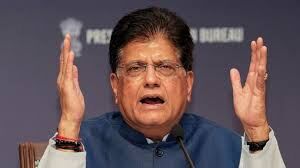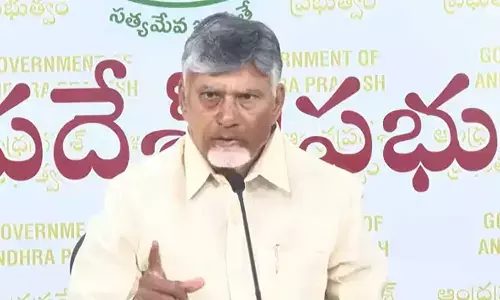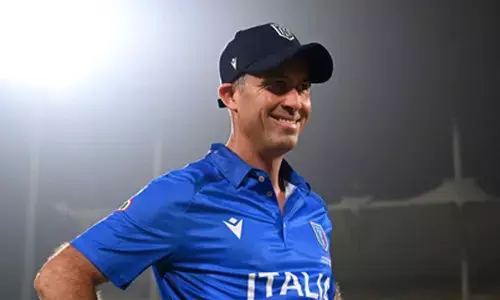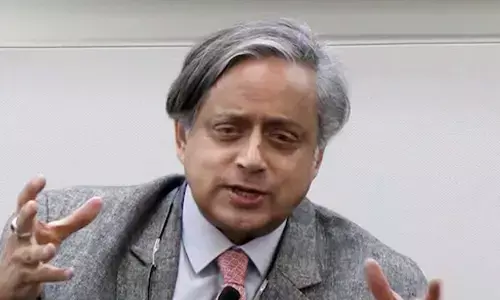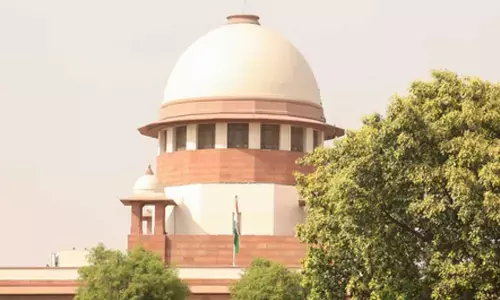MyVoice: Views of our readers 8th May 2022

MyVoice: Views of our readers 8th May 2022
MyVoice: Views of our readers 8th May 2022
Shed colonial consciousness, cherish our own heritage
Sadly, a merely 150-year colonial assessment of India (at least a five-millennium old civilisation) in scientific and intellectual achievements has become a benchmark for all Indians. It is an inherent feature of colonial consciousness to believe that everything we had was either fake or borrowed from Greeks, Chinese, Babylonians, Mesopotamians, or Arabs. Nevertheless, India, indeed, has a great intellectual heritage and a huge corpus of texts (the broad five groups -Vedas, Upavedas, Vedangas, Puranas, and Darshanas) covering all fields of human activity is a testimony of the capacity of Indians to create knowledge indigenously.
Ayurveda, a 5000-year-old tradition, has two main schools: Charaka and Sushrutha. Charaka Samhita (likely 500 BCE) has 120 chapters divided into eight sections of surgery, paediatrics, head and eyes, mental diseases, reproductive systems, pharmacology, therapeutics, and toxicology. It mentions plant products (from the root, bark, pith, exudation, stalk, juice, sprouts, fruit, flower, ash, oils, thorns, and so on); 165 types of animal products; and 64 minerals for therapeutic purposes. This book had Persian, Arabic, and Latin translations; the Arabic translation was Al-Beruni's chief source of medicine.
Charak was as 'scientific' and 'rational' as expected even if viewed from the perspective, though unfair, of modern times. Hippocrates might have had his achievements and he may have existed before or after Charak but the latter had some solid contributions to the cause of medicine.
The recent controversy on medical college students delivering the Charak Shapath with later suspension of a medical college dean points to a deep colonial consciousness pervading the country. The oath is simply a tradition and a broad reiteration of some ethical principles not binding (least of all legally) in any respect. As one author notes, the Hippocratic Oath (original or modified) is inadequate to address the realities of a medical world that has witnessed huge scientific, economic, political, and social changes. Euthanasia, legalised abortion, absolute privacy of medical records, and so on would be going against the tenets of original Hippocratic oath.
One question is that does this traditional oath even have a relevance in modern times? The answer would be affirmative to a traditional society like India. Traditions are simply handed down from one generation to another and unless they positively harm the society, a traditional society would not question them and neither would they have answers for the 'why' of traditional practices. "Why do you wear bangles?' 'Why do you wear a Bindi?" These questions do not make sense and do not have answers except a single answer that they are traditions; an answer which fails to satisfy people demanding 'scientific' explanations.
As Dr Balagangadhara Rao's thesis goes, India is a traditional culture where the 'how' question is important. Such cultures root in rituals and which in turn brings people together. The western culture, which roots in religion, has the 'why' as its most important question. Science, atheism, and division of people is a natural outcome of such cultures. The colonials, coming from a western culture, took a 'scientific' view and developed a deep antipathy to Indian traditions, including its medicine, notwithstanding some of its great developments.
Unfortunately, post-independent thinkers and influential politicians shared the same view of traditional India. The past as primitive; the future as golden; and the present as a stepping stone, was a straight-line historical narrative derived from the west. Charak oath (or shapath), equally modified from the original as the Hippocratic oath, caters to the modern world with different realities. However, a colonial consciousness believes that somehow Hippocratic oath makes more sense than Charak oath leading to even silly decisions like expelling a dean of a medical college. Can we ever have pride in ourselves or do we just soak ourselves in the colonial narratives? Is secularism simply denying our traditions and past completely?
Dr Pingali Gopal, Hanumkonda
Practising humanity and aiding needy world over
The World Red Cross Day has evolved into a significant historical event over the years. The 8th of May is World Red Cross and Red Crescent Day, a global day to honor the solidarity of our international Red Cross and Red Crescent movements, as well as the bravery and accomplishments of our volunteers and employees around the world, whose life-saving and life-challenging services ensure that we uphold our promise to humanity every day.
The International Committee of the Red Cross founder Jean Henry Dunant's birth anniversary is commemorated on this day. The Red Cross is involved in several initiatives and services. Its principal goal is to inspire, initiate, and support all types of humanitarian operations at all times and in all circumstances, based on seven principles: humanity, impartiality, neutrality, independence, volunteer service, unity, and universality. Each year, disasters and crises devastate millions of people.
As part of the world's largest humanitarian network, the Red Cross and Red Crescent provide assistance and hope in virtually every corner of the globe. They are on the front lines of every crisis, frequently in perilous situations and at tremendous personal risk.
The main goals of World Red Cross Day are to provide relief and comfort to people who have been injured and to prevent disaster deaths. The day is commemorated to encourage and aid those who have been affected by natural disasters, disasters, war, and other comparable situations. It not only protects their lives but also gives financial assistance to assist them in escaping their situation.
Each year, the Red Cross or Red Crescent assists one in every 65 persons around the world. The Red Cross has been awarded the Nobel Peace Prize three times. The Red Cross of the World fosters self-awareness and enables young people to learn about the strategies and procedures that are critical for our generation's and future generations' survival.
The Red Cross Day is celebrated on a grand scale in order to raise public awareness of its significance. Giving without expecting anything in return is a beautiful act of charity. Therefore, be kind to others, engage fully in the event, and join hands with the Red Cross to assist those in need.
Dr Krishna Kumar Vepakomma, Hyderabad
Brazen attempt to distort history
Recently, the Central Board of Secondary Education (CBSE) decided to remove the history of Mughals and other Islamic rulers history from school syllabus. Even the versus of famous poet Faiz Ahmed Faiz have been dropped from Indian text books. From renaming places to editing school history text books, Indian Muslim Mughal past and other Islamic rulers history are being erased as Modi's government pushes Hindutva agenda. BJP government is trying to distort the history but it is said that even God's can't alter the past. Nobody can change history. Facts are facts.
Mahatma Gandhi was thrown of train in South Africa and the incident gave birth to non-allinghnment movement. Dr BR Ambedkar was humiliated because he was a Dalit and this made him emerge as architect of our constitution. Raja Ram Mohan Roy, Veereshalingam Pantulu,Jyothiba Phule, all, fought against social evils. This is history and this was history and we cannot change all above historical events.
Mughals not only ruled for more than 300 years, they also enriched India greatly and transformed it into superpower in their times. Rulers Akbar, Jehangir Shahjahan except Aurangazeb were deeply pro- Hindus. In Mughal Era there was not a single communal riot. Hindu-Muslim divide started from the British rule and this legacy is being followed.
Coming to Islamic rulers, Allauddin Khilji was most powerful ruler, who ruled the Sultanate of Delhi. At a time when most of the medieval world was being laid waste by the brutality of the Mongol armies, Khilji kept India and its culture and civilization safe from the scourge. Tipu Sultan was a great patriot and freedom fighter who fought wars against the British forces. Bahadur shah Zafar was the last Mughal emperor and was the leader of 1857 freedom struggle. When he was jailed, his two sons' severed heads were given to him in his breakfast plates. Such sacrifice was done by Bahadur Shah Zafar and now these BJP leaders deliberately ignore his contribution to India and they will criticise the Mughal rulers.
All Mughals from Babur to Bahadur Shah Zafar had a more than a presence of 300 years on the subcontinent and left a significant impact on Indian art, architecture, language and cuisine. Now their history can be removed easily from school books, but what about the history books written by our authors and historians? Will they ever be able to remove them from history books?
Previously there were films like Mughal-e-azam, Baidu Bawra,Waris Shah, Umrao jaan, Humayun,Taj Mahal etc in which Mughals were greatly glorified. Now in recent released films like Bajirao Mastani, Pakistani, Tanhaji, Kesari etc Mughal rulers are shown as deadly villains. In the recently released Kashmir Files, history is twisted and only half truth is told. Now Bollywood became a propaganda tool in which history is retold with inaccurate tales. Now we need films that allay, and heal wounds and not make citizens intolerant. It is hard to erase history and it is hard to forget the Islamic rulers' contribution in art and architecture and shaping India as a wealthy nation.
Zakir hussain, Kazipet
'Mother is the first teacher'
A child under the age of five spends most of his time at home and therefore learns a lot from what he sees at home. Chhatrapati Shivaji was told many stories of heroes by his mother in his childhood and he grew up to become a hero to many people.
It is at home that a child first learns socialisation. A child first learns a lot at home. This is because, a child learns what is accepted and what is not, what is right and what is not. He can spend enough time with his family, which strengthens his bond and he grows up to be a confident person.
Even a little time for a child to spend with his family and especially the mother has a great impact on his impressionable mind. Someone has rightly said that "God cannot be everywhere that's why he made a mother." So the person who loves the child the most is always a mother. The mother has the most affection for the child. She is not only the mother but also the first teacher of the child. She makes a lasting impression by teaching the child from birth. A mother's education is divine.
Many mothers have made their childhood heroes with their unmatched love for their children. Recently there was news that a mother taught her daughter at home and she never went to school and now she has been called for admission to IIT.
Now the question arises if every mother is providing value-based education to her children then why there are so many issues in society? The answer is that many other factors affect the life of an individual and the education of the mother never puts the child on the wrong path.
Priyanka Saurabh, Hisar (Haryana)
Parties can't take voters for a ride – for always
V Ramu Sarma's article, 'Janata Ullu Nahi Hai' (Hans India, May 6) is very timely. It seems the battle lines for 'Ballot war' in Telugu states have already started, this time well before the stipulated time. The electorate choose their rulers to govern and implement their declared manifestos. But strangely, once elected, these leaders ignore the poll promises, thereupon come back with 'innovated' new techniques in next elections, to regain their lost confidence.
The Telangana Rashtra Samiti has been desperately making every attempt to retain its 'gaddi,' now for third time. With his own poll survey and being an astute politician, party chief K Chandrashekar Rao, also availed of the services of country's popular poll strategist Prashant Kishor to know the winnability chances of his party in coming elections. Interestingly, PK is himself testing the political waters to jump into the political bandwagon from his home state of Bihar. Perhaps, PK should be aware, a poll strategist with his statistical knowhow can successfully predict the fate of the professional politicians in polls, but the strategist could not win the polls himself.
The anti-incumbency factor dethroned TDP in AP during last election, and whereas in Telangana, TRS retained its power as crumbling Congress and other opposition parties could not match the organisational skill and charismatic speeches with local dialects of KCR. As substantial funds are eaten away by non-developmental schemes and salary, pension bills of its employees, infrastructure and development projects in AP, Telangana have taken back seat. Obviously, most of the poll promises of ruling parties are confined to posters and banners. The emergence of Aam Aadmi Party to power in Punjab recently proved that, 'Janata ullu nahi hai'.
After stabilising its position in northern belt, Bharatiya Janata Party now carefully setting its eyes on these two states, thus sending shivers to the spine of the ruling regional parties. While BJP top brass already launched its 'mission' in Telangana, instructing regional leaders to launch padayatras, national leaders started making 'beeline' to the state to rejuvenate the vigour of party cadre and also enlighten the electorate of ground realities. As such, unlike last, forthcoming Assembly polls are not a cakewalk for ruling parties in AP and Telangana.
Govardhan R Jilla, Mumbai
The writer V Ramu Sarma's remarks that people cannot be taken for a ride and silenced for ever, without an iota of doubt, is absolutely correct. In fact, no one can deny this factual truth which has marred the society to unbelievable depths. It is shameful that parties think of people's welfare only during the poll time and come up with promises for public consumption but never fulfilled to escape the wrath of people. Parties resort to vociferous lip service to the urgency of ending woes, coming up with remarks replete with half-truths and bombastic announcements. It is nothing but to brainwash people.
With elections in less than two years in both the Telugu states, opposition parties are mounting scathing attack on the governments on issues which for long are left unaddressed. Moreover, the usual stance taken by opposition in its eagerness to come to power by resorting to various sorts of blandishments and false promises is a clear revelation that nothing appears to be right in the way the states and country are being governed.
Like the rest of the country, both the Telugu states are divided on the basis caste, creed and religion. This has prevented people from choosing the right party. Time has come for voters to show the doors to ruthless politicians mastering the art of political survival by playing to the gallery at election time, by recognising and electing potential meritorious candidates with honesty and integrity, thereby punishing corrupt and the delinquent.
K R Srinivasan, Secunderabad









